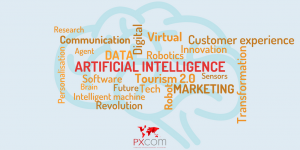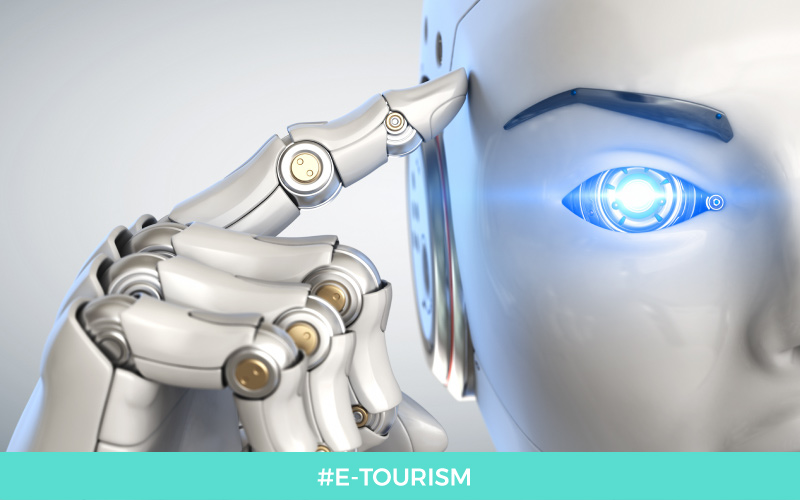Artificial intelligence to bring major changes to tourism
Artificial intelligence is set to revolutionise tourism, on all scales — robotic doormen at hotel entrances, rooms that customise themselves depending on the occupant tastes, virtual visits of touristic sites before going there in real conditions — despite some impediments. Let’s deal with this ongoing revolution!
Concretely, what is artificial intelligence?

Artificial intelligence is the combination of three elements:
- A software based on algorithms, programmed to memorise, analyse, forecast and decide (an action, for example)
- Data, mostly history and statistics, to supply this software. The more they have numbers and data — what we call Big Data — the more relevant the analysis, forecasts and decisions will be.
- Sensors, to give real time information to the software. For example, a geographical location, the temperature of a precise place, a sentence that someone pronounces. These information influence the forecasts and decisions. Once they are memorised, they are used to improve the analysis meant to help in the forecast and decisions processes.
This is mostly how our brain works when we take an umbrella before leaving home as the sky is covered in large grey clouds.
Robots to replace humans to welcome, clean, serve and listen
The most spectacular application of artificial intelligence is obviously robotics. We imagine even more easily what it could lead to, as we are nourished by ‘Star Wars’, or at least what it already does in the hotel industry — a robot-doorman to welcome us right after we get out of the cab, catch our luggage and guide us to our room inquiring about our travel vagaries and our schedule for the upcoming days.
In Belgium, Gand’s Marriott Hotel took the plunge in June 2015 with his welcome robot Mario. Tomorrow, other robots could clean our room, after self-learning the place, doing the room-service, serving in restaurants or even be a museum or other touristic places guide.
Is the obstacle ethical? Deciding to massively replace humans by machine sets two major problems — jobs cut that could ruin the lives of many workers and the human contact abolition that could impoverish the travel experience.
More customisation to answer a high demand from the customers
Thanks to artificial intelligence software, tourism experts will be able to — and are already able to — better customise the services they offer to their customers. Indeed, this kind of software can memorise each customer’s habits — one prefers to have lunch in his room when others always ask for an extra blanket. This allows us to treat each customer as a unique guest. This customisation is highly expected by customers and could generate a significant sales revenue for the tourism experts, as a study from Sabre and YouGov demonstrates.
We can already imagine that tomorrow, an intelligent room will be able to recognise its occupants, thanks to facial recognition sensors placed in mirrors. This intelligent room will also be able to set the room temperature by itself and to change its digital decorative frames to fit the occupants tastes and preferences. Moreover, thanks to beacons spread across the town, the intelligent room could know when the customer is on his way back to his room — this beacon detects nearby smartphones traffic — so that it could increase the room temperature, open or close the shutters and put the occupant’s favourite beer can in the fridge.
Is the obstacle legal? It is all about the new European GDPR (General Data Protection Regulation), mandatory since May 2018, about the respect for private life. The GDPR decrees that every European citizen, wherever he is, has to be informed about the use of its personal data and about how the algorithms process his data so that he can agree or not.
Virtual visits of touristic places before deciding to actually visit them
Artificial intelligence also leads to augmented reality — glasses able to follow the moves of the person who wears them make this person virtually visit a touristic place, as if he was there for real. Here is an example of two operational applications: Morrocco’s Tourist Office offers virtual visits of Marrakech alleys to make people want to actually visit Marrakech for real. Palladium chain, in Balearic Islands, make travel agencies virtually visit its hotels, so that they can promote them in a better way.
Is the obstacle economical? Affordable glasses cost between €50 and €600 (depending on the image definition quality), but the production of ad hoc videos cost between €2,000 and €150,000, depending on the length and the browsing complexity.
Be careful not to put an end to the charm of chance!
During the Travel Experts Days (22-24 November 2017), held in Lille, France, Jean-François Gomez, Platform Councillor for distribution, hotel and industry sectors at Microsoft, took the liberty of making a comment about AI: “All these technologies aim to put an end on chance, but this is what makes tourism charming. We will have to work on maintaining it.” Sleep on it!






